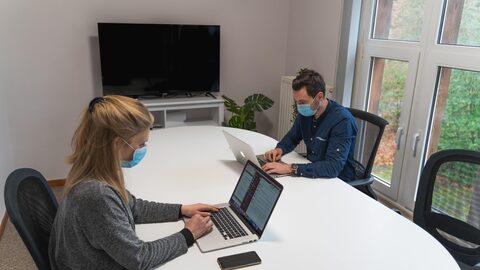
As we enter into the ‘new normal’, the return to the workplace can be difficult for many as we all process the experiences we’ve been through in recent times. It can feel like so much has changed, and yet can feel like we’ve been running on the spot.
This sudden shift back to normality will appear quite daunting for employees who have been predominantly working from home, especially as we consider our mental health and the affect the last year has had on it.
We’ve spent a considerable amount of that time around our family members, children, pets, spouses, or even just ourselves. We’ve lived out the last year connecting with people through screens and creating social distance to keep ourselves safe, so an interactive world in public can feel a bit overwhelming.
Just like physical health, mental health is incredibly important to nurture and take care of in order to maintain our wellbeing. It’s been estimated that in the last year 41% of employees experienced symptoms of compromised mental health caused by work. This shows that taking action to mitigate mental health risks is as important as ever, and it’s up to businesses everywhere to ensure they make their workplaces as mental health-friendly as possible.
Giving yourself and your staff the tools to cope mentally will make the transition back to a blended form of working, and being amongst colleagues, much easier.
There are many ways in which we can take care of our mental health by reducing work-related stress, and minimising the pressure of returning to spaces that have been largely empty for the last year.

Returning to the workplace can be difficult to deal with as a lot of people have become accustomed to being under heightened levels of stress over the last year. This can cause some anxiety in social situations, as the change can be a bit of a shock to the system.
Likewise, some staff may have lost loved ones over the last few months, so it’s important they don’t feel rushed to make the transition back to the office and feel supported in managing their feelings.
It’s important for all managers to keep in contact with staff they work with, to give everyone the opportunity to voice any concerns or be open about how they’re coping.
Checking in with frequent one-to-ones or having team meetings to balance workloads will be massively beneficial, as it keeps everyone on the same page and will help to solve any potential issues as they arise.
Many office spaces may have changed, downsized, or upscaled in the last year, so working spaces will look a little different upon return. Desks may have been moved, partitions may have been added, or more hotdesks might be used.
These, and any other changes or new restrictions have to be communicated effectively to employees so they know what to expect on their return. This will help with making them feel secure and safe in their new working environment.
Some people haven’t had much social contact within the last few months, or may have been shielding for most of the last year. So, it can be tough for them to go back to face-to-face contact immediately.
They may even insist on maintaining boundaries and physical space barriers, so sitting too close to others or sharing communal areas might be a bit of a struggle. Make sure everyone’s comfort level is catered for and support mechanisms are in place where needed.
You may even want to invest in social distancing bands. They work on the traffic light system with green meaning ‘happy to engage with others’, orange for those who are still cautious and red for people who are still participating in social distancing.


Fear and anxiety will be common emotional responses that people will feel when returning to the workplace. So at first you should expect that some protocols or working hours may need to be flexible to accommodate your staff.
This may take some time, or a fair deal of trial and error, but once everyone has a balanced approach to their work patterns, they’ll become more comfortable with being back in the working environment.
The stigma surrounding mental health is slowly fading, but there is still work to be done to get people comfortable with discussing it and taking care of theirs.
Set up wellbeing initiatives within your organisation that help your employees get any help they may need, and that lets them know there is always someone they can talk to. You can always sign up to a mental health scheme, run charity events, or promote local mental health services.
We have several initiatives in place to help our people cope with daily mental health issues.
We have partnered with Bupa: Healthy Minds to provide our staff with a 24/7 completely confidential employee stress helpline. Here they can talk to trained professionals about managing stress, arrange further counselling sessions, and speak about mental health resources.
While also having an Employee Hub set up where staff can access resources such as our stress risk assessment, stress toolkit, and tips and videos on how to manage mental health.

For the last year, our charity of the year has been Mind – one of the leading organisations that provide advice and support to empower anyone experiencing a mental health problem. They also regularly campaign to improve services, raise awareness and promote understanding of mental health. We’ve run several charity events in aid of the fantastic work they do, with more to come, and have so far raised a significant amount through our collective efforts.